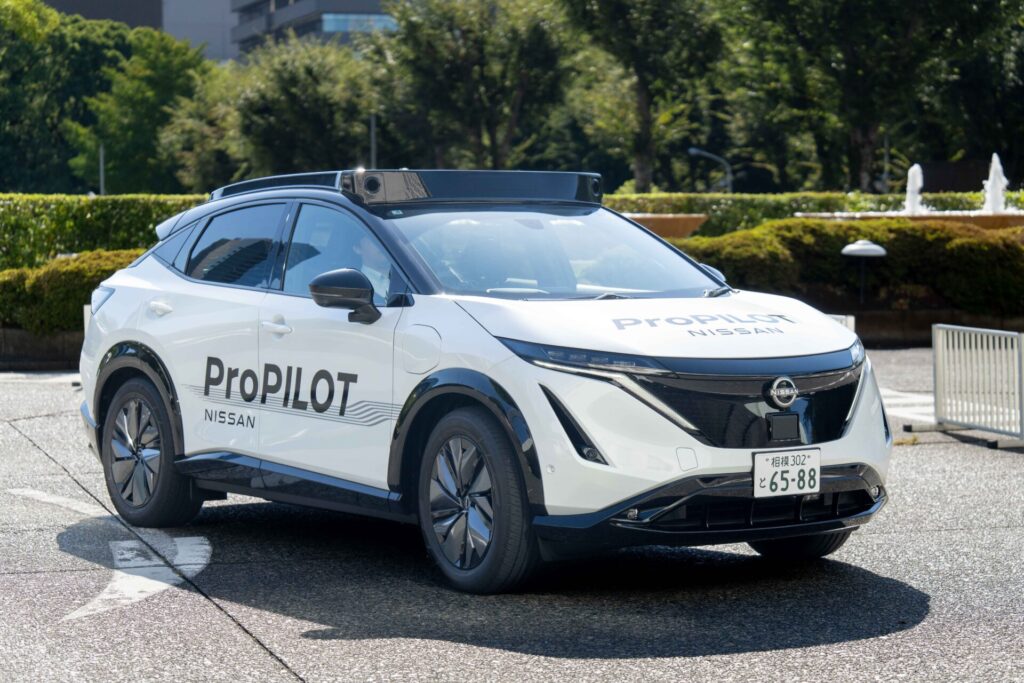Nissan Unveils Next-Generation ProPILOT Technology to Rival Tesla’s FSD System
Nissan has recently revealed its latest innovation in driver-assist technology, the next-generation ProPILOT system, with aspirations to compete with Tesla’s Full Self-Driving (FSD) system. Demonstrated on prototype Ariya vehicles in downtown Tokyo, the new ProPILOT utilizes 11 cameras, five radar sensors, and a cutting-edge LiDAR unit to navigate complex city streets.
At the core of this advanced system lies the “Wayve AI Driver” software, developed by UK-based autonomous driving company Wayve. Nissan has emphasized that this AI can analyze visual data from multiple cameras to predict traffic scenarios and make decisions akin to a skilled human driver. Paired with Nissan’s own “Ground Truth Perception” suite powered by LiDAR, the system promises enhanced safety during high-speed driving and in low-light conditions.
During the unveiling, Nissan boldly stated, “We think ours is smarter than Tesla FSD, just not as polished as a product.” The automaker is eyeing a Japan launch for select production models by fiscal year 2027 (by March 2028).
This move by Nissan comes as Tesla’s camera-only FSD (Supervised) system continues to gain traction. In recent tests, FSD outperformed Chinese advanced driver-assistance systems (ADAS) in crash avoidance, showcasing its efficacy. Additionally, Tesla is gearing up to release FSD V14, which CEO Elon Musk has described as a significant update to the system, potentially making it 2-3 times safer and more proficient than human drivers.
Nissan’s ProPILOT technology has evolved from single-lane highway assistance to multi-lane support with ProPILOT 2.0. This next iteration aims to bring AI-powered driving capabilities to densely populated urban areas. Nissan’s Chief Technology Officer, Eiichi Akashi, expressed that the system will provide a driving experience akin to having a skilled human driver at the wheel.
“It will adapt to more complex traffic conditions and truly provide greater confidence and peace of mind — enhancing safety not only for the driver but for everyone using the road,” Akashi added.
With the relaunch of ProPILOT, Nissan is striving to reaffirm its position as a technological leader in an industry increasingly dominated by Tesla. The success of Nissan’s ambitious promises remains to be seen, particularly as Tesla accelerates its FSD deployment globally.
In conclusion, Nissan’s foray into advanced driver-assist technology signals a significant step towards autonomous driving capabilities, setting the stage for a compelling competition with industry frontrunners like Tesla. Only time will tell if Nissan can deliver on its bold claims and establish itself as a formidable contender in the rapidly evolving automotive landscape. The world is currently facing unprecedented challenges, with the ongoing COVID-19 pandemic causing widespread disruption and uncertainty. As countries grapple with rising cases and overwhelmed healthcare systems, the need for effective and coordinated responses has never been more urgent.
One key aspect of the global response to the pandemic is the development and distribution of vaccines. Scientists and researchers around the world have been working tirelessly to create safe and effective vaccines to combat the spread of the virus. The rapid development of multiple vaccines, including those from Pfizer-BioNTech, Moderna, and AstraZeneca, has been a remarkable achievement in the fight against COVID-19.
However, the distribution of vaccines has been a major challenge. Wealthier countries have been able to secure large quantities of vaccines, leaving poorer nations struggling to access sufficient doses for their populations. This has led to concerns about vaccine inequity and the potential for the virus to continue spreading in regions with limited access to vaccines.
In response to these challenges, international organizations such as the World Health Organization (WHO) and the COVAX initiative have been working to ensure equitable access to vaccines for all countries. COVAX, a global initiative co-led by the WHO, Gavi, the Vaccine Alliance, and the Coalition for Epidemic Preparedness Innovations (CEPI), aims to provide vaccines to low- and middle-income countries.
Despite these efforts, vaccine distribution remains a complex and challenging task. In addition to securing doses of vaccines, countries also need to address logistical challenges such as storage and distribution, as well as ensuring that vaccines are administered efficiently and safely to their populations.
Another key issue that has emerged in the distribution of vaccines is vaccine hesitancy. Some people are hesitant to receive the vaccine due to concerns about its safety and efficacy. Misinformation and conspiracy theories have also played a role in fueling vaccine hesitancy, making it more difficult to achieve widespread vaccination coverage.
To address vaccine hesitancy, governments and health authorities need to engage in effective communication campaigns to provide accurate information about the vaccines and address concerns. Building trust in the vaccines and the vaccination process is essential to ensuring that as many people as possible are willing to receive the vaccine.
As the world continues to navigate the challenges of the COVID-19 pandemic, the importance of global cooperation and solidarity in the distribution of vaccines cannot be overstated. Ensuring equitable access to vaccines for all countries is crucial to ending the pandemic and restoring normalcy to our lives. By working together and prioritizing the needs of the most vulnerable populations, we can overcome this crisis and build a healthier, more resilient world for all.

